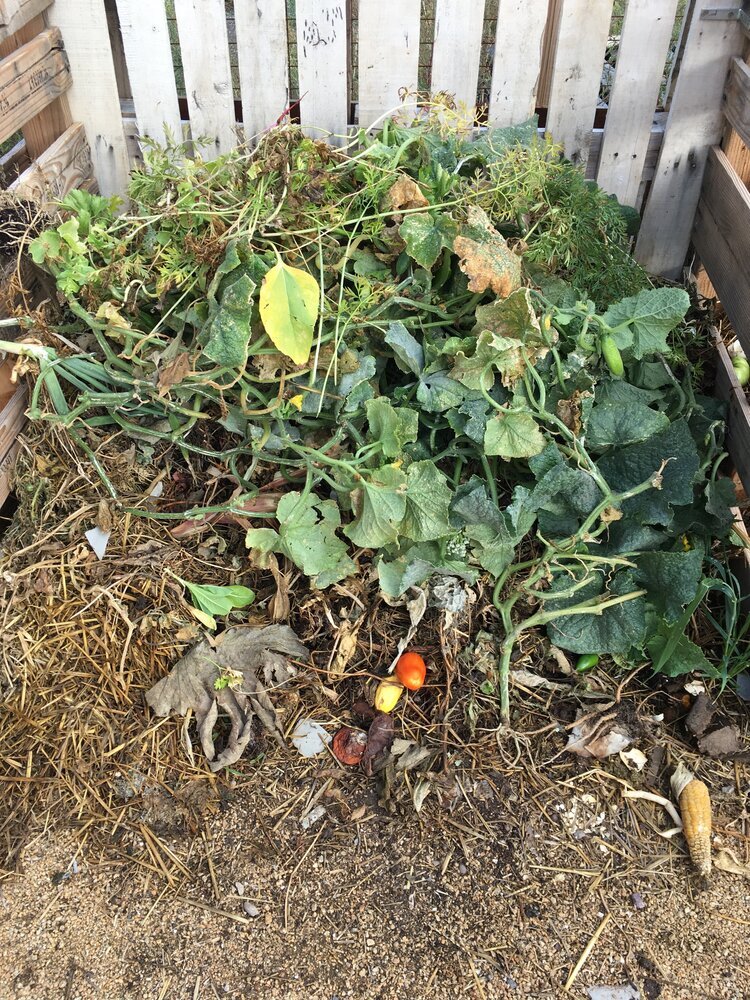Revolutionary Composting
This week’s blog is written by guest writers Caitlyn Lewis, Therese Robbins, and Alison Coluccio of Soil Cycle. Last week they taught a workshop on composting, and were kind enough to send along more thoughts on the matter. Read on below..
Compost Bins at Milwaukee Trail Community Gardens
"If you have surveyed the troubles of our time, and cannot discover a way forward, do not despair...you might come to see that forward movement is no longer possible in these moments, and that the way to go was never forward anyway – but awk-ward: ... into the shadows of sanctuary...into the heat of compost" - Bayo Akomolafe
In a time of global dis-ease and uncertainty, many people are learning to appreciate the most elemental skills of sustenance: planting seeds, harvesting, cooking, and returning unused plant materials back into living soil by composting. This process of turning organic materials into healthy soil then back into food can be considered a fully revolutionary act in our current society. To nourish our land and ourselves with things we would otherwise have seen as waste is radical in every sense of the word. When people place their hands in soil and find food, not only are they able to provide essential means of sustenance, but they can reconnect and feel the bond between the earth, their food, and all other living beings. Gardening, composting, and building healthy soil are the keys to good health, self-sufficiency, and caring for our finite planet and all those living upon it.
Gardens can be sanctuaries: several studies have shown that Mycobacterium vaccae, found in soil and compost, promotes health and boosts serotonin. Simply putting your hands in the soil as you plant can soothe and heal. Using compost to create nutrient-rich soil means that you can grow and eat healthier food, a crucial part of building healthy immune systems that help individuals withstand the stressors of our uncertain world. Healthy soil means healthy food, which in turn means healthy bodies and minds.
Cookin’ Compost at the Bitterroot Line Community Garden
Knowing how to compost means creating nutritious soil for free, and once the principles are understood, composting can take place anywhere from a country lot to an urban apartment. For example, Ron Finley, of Los Angeles, worked to change city laws to allow gardening in street boulevards showing people that gardens can flourish even between asphalt and concrete. Life thrives in the most unlikely of places, inspiring us to rethink what we consider as agricultural land. Creating your own soil and growing food can happen anywhere including front lawns and apartment balconies.The revolutionary act of composting reaches far beyond gardening though. Composting is integral to reducing greenhouse gas emissions and mitigating climate change. When compostable materials are instead landfilled, they quickly become anaerobic, being broken down by bacteria that do not require oxygen. These bacteria work much more slowly than typical composting bacteria and generate methane gas, one of the most potent greenhouse gases. When outbreaks of human or crop diseases disrupt supply chains and divert produce to landfills, their nutrition not only goes to waste but it also adds fuel to our mounting climate crisis.
Composting allows individuals to reclaim and participate in an essential natural cycle, while feeding themselves and their loved ones nutritious food, learning necessary skills, and reducing their impact on the planet. Dr. Neil deGrasse Tyson reminds us that, “We are biologically connected to every other living thing in the world. We are chemically connected to all molecules on Earth…We are not figuratively, but literally stardust.” Composting keeps these precious star-born elements cycling in the living, breathing world. Even if we have forgotten, we too are part of that cycle. These are difficult times but they are good times to begin composting, thriving, and growing.
This is a journey of reconnection. How can you participate in the simple, yet revolutionary act of composting? Organizations like Soil Cycle and Garden City Harvest strive to offer education and inspiration in that process. Soil Cycle, a composting non-profit in Missoula, works to ensure that food "waste" is not wasted, but reclaimed. Through their educational programs, they seek to empower home and community garden compost projects. To learn more about how to compost, whether at home or through Soil Cycle’s service, see our website for upcoming workshops, products, and services. (SoilCycleMissoula.com)
We hope this article leaves you inspired to dive into composting! Garden City Harvest provides house composting stations at all of our Community Gardens. If you’re a community gardener who’d like to learn more about how to manage the bins at your garden, send your thoughts by email to info@gardencityharvest.org, or reach out to our Community Gardens team!


